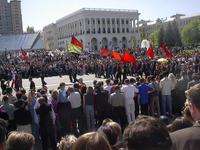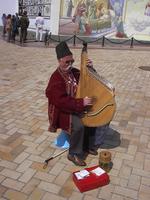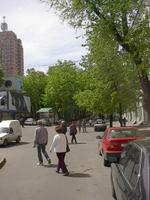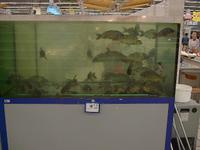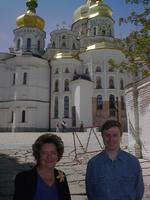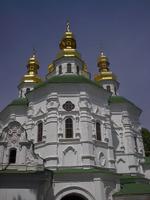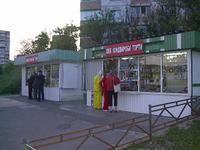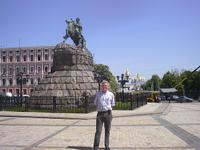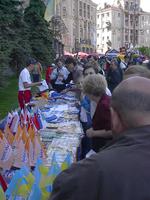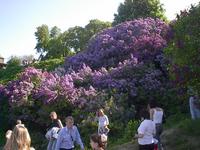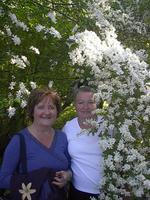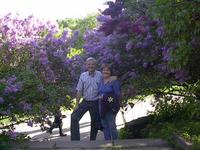After the long day yesterday, I would have thought we would sleep well last night. Neither of us did. I think one problem I had was that my mind kept right on working, especially in assimilating new words and constructions in Ukrainian, making associations with Russian equivalents. As Dima told us, in L’viv, 100% of the people understand Russian; 80% of them don't like it. In Kyiv it was common to hear conversations in a mixture of the two languages; many people there, and especially the educated professional classes over 30, understand Ukrainian and can speak it to some degree, but they work and think in Russian. L’viv, on the other hand, is the seat of Ukrainian nationalism. The more Ukrainian one uses, the better off he is.
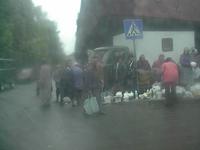
When we did get up, we found our shoes were still wet. We should have set them by the furnace in the bathroom; perhaps they would have dried out some. Not that it would have made a great difference in the course of the day. The weather was still wet and we were going to be out in it.
(Left)Sidewalk convenience store: fresh milk sold in every conceivable type of container, from Coke bottles to water bottles.
Breakfast was brought to our room (we’re sleeping on the couch in the living room) and it included sandwiches with homemade liver paste. I saw it in the loaf pan when I took the tray back to the kitchen. Tonya, Volodya’s wife, noticed we hadn't eaten the sandwiches, so I explained that I eat liver at other times, but it's not what we want the first thing in the morning. There were also the usual sandwiches, "butter-brot" in Ukrainian, (bread, butter, with a small slice or two of cheese and a couple of pieces of pork salami), along with two boiled eggs for each. Everything Abbie shouldn't eat!
The day we left Madeira the doctor looked at the last results from Abbie's blood tests and told her that her cholesterol levels were high. He gave her a sheet of paper with lists of foods to avoid and those that are allowable in limited amounts. Probably 80-90% of what we've been offered here is on the 'no-no' list. We keep thinking that when we get to Andriy's house Monday the menus will be healthier. As doctors, he and his wife are both aware of the need for proper nutrition.
The program for today was a trip to the mountains. When I was here two years ago, Volodya mentioned that the Carpathian Mountains were an hour or so away by car, and I decided that if at all possible, I would like to see them. In my mind I pictured them to be something like the Rocky Mountains, with towering, majestic peaks. The weather hadn't improved, but we decided to go and see what we could in spite of the rain and clouds.
Andriy (not the Andriy we’re to visit next week), Dima's friend who had picked us up at the airport, was going to take us to the mountains, and he had to stop for fuel at the gasoline station on the way out of town. To his surprise, he was informed that a 10-liter (2.5 gal) limit per customer has gone into effect, apparently since the presidential elections, when the Russian-backed candidate lost to the pro-Western Yushchenko. The resulting strain in relations with Russia is reflected in the petroleum imports, leading to rationing. This crisis was also cited as the reason why service stations in Kiev often posted a flat rate price of 6 UAH ($1.20)/liter for various grades of fuel, when the actual prices range from a little under 3 UAH to a little over that. I never understood the exact strategy behind that, but I got the idea it was mainly a political statement.
Andriy drove us through areas of flat farm lands dotted with small villages. Everything was green, of course. In the distance we could just make out a large field carpeted with yellow blossoms: turnips. Fields of potatoes and onions were being worked by hand; cattle grazed in pastures everywhere. More than once we were forced to share the road with cows being taken from one pasture to another. As we neared the mountains themselves, the landscape turned into rolling hills.

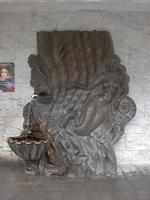
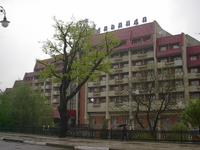

Andriy took us to Morshin, a small village known for its mineral water, and it was set up for tourism because of the springs there. There were several hotels, one of them six or seven stories high.
(Below, left) Lavanda Hotel, Morschin. But the tourism was directed towards domestic, not international visitors. Poles perhaps would come, due to their geographical proximity (the border a little over an hour's drive from there), and the similarities in the Polish and Ukrainian languages would make up for the fact that signs and information were only in Ukrainian. Two days before, at the botanical gardens in Kyiv, we had seen children cooling off, playing in the pool of water surrounding a fountain. Here we were again around water, but the steady rain and cold mountain air was a complete contrast to the scene two days before. We filled our bottles with the spring water, and drove on towards the mountain.
(Upper right) A very fancy water fountain! (Lower right) Billboard advertising the local mineral water, with the slogan "Always with you." (Upper left) The ever-present Orthodox Chapel and its distinctive steeple.The road was a mine field of pot holes, and it ran more or less parallel to a mountain stream. At one point it wound through a small village where the yard of every house had apple trees in bloom. The only central point in these villages was the ever-present Orthodox Church, with the onion-shaped steeple tops and crosses. Unlike the main churches in Kyiv, which have shiny gold minarets, these are silver-colored or painted green. There seemed to be no sort of commercial activity to justify being called a business district...even one store.

We drove up to a gate that announced the entrance to a national park. Once again, you had to know it was there and know what turns to make, because there were no signs directing people there. I had remarked to Abbie that Andriy must have known where he was going because he made turns at forks in the road, with no apparent reason for choosing left over right or vice-versa.
Andriy got out and talked a while with the guards at the gate. We thought perhaps the road to the top was closed, but all the information we got was that for $4 we could ride to the top on horseback. That was not an option we would take in good weather, let alone in the cold drizzle we were trying to make the best of.
By now we had concluded that the Carpathian Mountains are more like the Ozark Mountains than the Rockies. The sign at the entrance to the park confirmed our conclusion. It gave the elevation of the summit of the highest peak: 680 m (2244 ft.) above sea level. As far as that goes, we have much higher mountains on Madeira. The island is only 13 miles wide (21 km) and the central peaks are over 1600 m (5280 ft) above sea level. (What I found out later is that we only got into the foothills, and that the Carpathians do form a chain of rugged mountains, with the highest peaks over 8,000 feet in elevation.)
 (Left) With the fog, we could only guess what the view would be on a clear day.
(Left) With the fog, we could only guess what the view would be on a clear day.
With all the recent rains, the unpaved road to the top was a challenge for the driver. He had to choose which rut to follow, or more likely, which ones to avoid to keep from getting stuck. Three or four kilometers up the road we came upon a group of buildings where people obviously come to have picnics and camp in the summer months. The little shelters and restaurant were made out of logs. A sign advertised ice cream, not likely to attract much business in this kind of weather.


It was around noon, but meals had to be ordered in advance. Andriy put in an order for the five of us, which would be ready in an hour or so. In the meantime we would go on up to the top and look around. At the top there was a grassy knoll, at the far end of which was a small Orthodox chapel.
(Above, left) View of the inside of the chapel. The black-and-red cross-stitching is very typical. Later, Abbie asked a lady at a museum what the significance of the two colors is. Black represents the earth (the soil is very black where we were) and red represents the blood of the Ukrainian people. The muddy ground made walking dangerous at times and miserable at best. Our feet were completely wet and almost numb from the cold. Abbie didn't stay out long and went back to sit in the car while the rest of us climbed the rocks and peeked in caves carved into the solid rock that were used by persons hiding from authorities. I was never quite sure of the date they were carved, but I thought I saw a sign there with the date of 1100 AD. The four of us guys climbed the rocks and passed through a narrow gap between two huge rock formations. The local tradition says that your soul is cleansed as you pass through this gap. I can guarantee that souls over a certain size have no hope of getting cleansed by that method.



 (Above)Caves carved out of solid rock. Wet rock climbing is tricky business. (Left) Yuriy coming through the cleft of the rock. (Right)
(Above)Caves carved out of solid rock. Wet rock climbing is tricky business. (Left) Yuriy coming through the cleft of the rock. (Right) My turn to be between a rock and a hard place.
We went back to the camp ground, where our meal was ready. We ate in a small log hut built in typical Ukrainian style. Basically it's a square structure with the fireplace in the center and the chimney rising out of the peak of the pyramid-shaped roof. The entrance occupied 1 of the 4 areas around the fireplace and tables were set in the other 3 coves. We had a bowl of mushroom soup...not cream of mushroom like you get in a can...more of a broth with mushrooms in it. This was followed by the typical potato dumplings and tea. The meal for the 5 of us cost $17.






TOP
(Left) The entrance to the camp ground. (Right) Maybe another reason we thought the Carpathians were like the Ozarks: an Arkansas razorback!CENTER
(Left) Outside the tiny dining hall. (Right) The fireplace in the center, and fortunately it was working!
BOTTOM
(Left) A blown fuse meant a candlelight dinner, and a long, available-light exposure turned Yuriy into a ghost. (Right) A fresh mushroom soup that hit the spot.
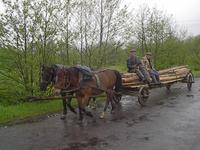 It's still common to see fields being plowed with horses and horse-drawn wagons being used to carry lumber or hay.
It's still common to see fields being plowed with horses and horse-drawn wagons being used to carry lumber or hay.Before returning to town we visited a nearby monastery, but we were so cold and wet that we weren't too interested in anything except getting back to a warm house and dry clothes.
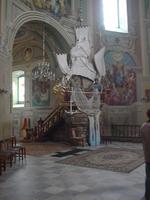
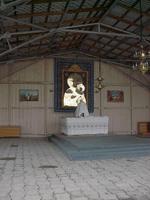 (Left) An unusual pulpit built in the shape of a boat, with 2 figures casting nets. Taking Jesus' words about being "fishers of men" literally? (Right) Gold-foil embellished icon over an altar in an outdoor pavilion at the monastery.
(Left) An unusual pulpit built in the shape of a boat, with 2 figures casting nets. Taking Jesus' words about being "fishers of men" literally? (Right) Gold-foil embellished icon over an altar in an outdoor pavilion at the monastery.



